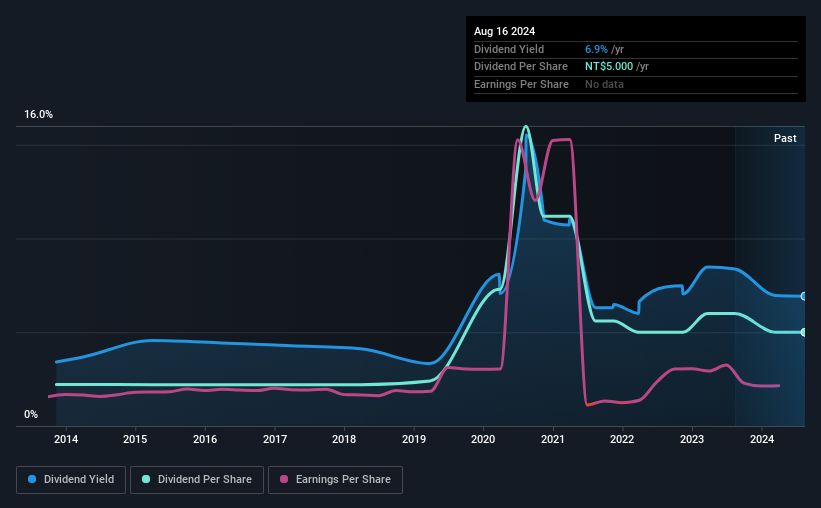Tahsin Industrial (TWSE:1315) Is Due To Pay A Dividend Of NT$2.50
Tahsin Industrial Corporation (TWSE:1315) has announced that it will pay a dividend of NT$2.50 per share on the 27th of September. This makes the dividend yield 6.9%, which will augment investor returns quite nicely.
View our latest analysis for Tahsin Industrial
Tahsin Industrial Is Paying Out More Than It Is Earning
If the payments aren't sustainable, a high yield for a few years won't matter that much. Before making this announcement, the company's dividend was much higher than its earnings. This situation certainly isn't ideal, and could place significant strain on the balance sheet if it continues.
Over the next year, EPS could expand by 8.1% if the company continues along the path it has been on recently. If the dividend continues on its recent course, the payout ratio in 12 months could be 140%, which is a bit high and could start applying pressure to the balance sheet.

Dividend Volatility
Although the company has a long dividend history, it has been cut at least once in the last 10 years. The annual payment during the last 10 years was NT$2.22 in 2014, and the most recent fiscal year payment was NT$5.00. This means that it has been growing its distributions at 8.5% per annum over that time. We like to see dividends have grown at a reasonable rate, but with at least one substantial cut in the payments, we're not certain this dividend stock would be ideal for someone intending to live on the income.
Tahsin Industrial May Have Challenges Growing The Dividend
With a relatively unstable dividend, it's even more important to evaluate if earnings per share is growing, which could point to a growing dividend in the future. Tahsin Industrial has impressed us by growing EPS at 8.1% per year over the past five years. While EPS is growing at a decent rate, but future growth could be limited by the amount of earnings being paid out to shareholders.
Tahsin Industrial's Dividend Doesn't Look Sustainable
Overall, it's nice to see a consistent dividend payment, but we think that longer term, the current level of payment might be unsustainable. While we generally think the level of distributions are a bit high, we wouldn't rule it out as becoming a good dividend payer in the future as its earnings are growing healthily. We would be a touch cautious of relying on this stock primarily for the dividend income.
It's important to note that companies having a consistent dividend policy will generate greater investor confidence than those having an erratic one. Still, investors need to consider a host of other factors, apart from dividend payments, when analysing a company. Case in point: We've spotted 3 warning signs for Tahsin Industrial (of which 2 are significant!) you should know about. Is Tahsin Industrial not quite the opportunity you were looking for? Why not check out our selection of top dividend stocks.
Valuation is complex, but we're here to simplify it.
Discover if Tahsin Industrial might be undervalued or overvalued with our detailed analysis, featuring fair value estimates, potential risks, dividends, insider trades, and its financial condition.
Access Free AnalysisHave feedback on this article? Concerned about the content? Get in touch with us directly. Alternatively, email editorial-team (at) simplywallst.com.
This article by Simply Wall St is general in nature. We provide commentary based on historical data and analyst forecasts only using an unbiased methodology and our articles are not intended to be financial advice. It does not constitute a recommendation to buy or sell any stock, and does not take account of your objectives, or your financial situation. We aim to bring you long-term focused analysis driven by fundamental data. Note that our analysis may not factor in the latest price-sensitive company announcements or qualitative material. Simply Wall St has no position in any stocks mentioned.
About TWSE:1315
Tahsin Industrial
Manufactures and trades rainwear, garments, furniture products, office equipment, and corrugated boards in Taiwan.
Excellent balance sheet second-rate dividend payer.
Similar Companies
Market Insights
Community Narratives




